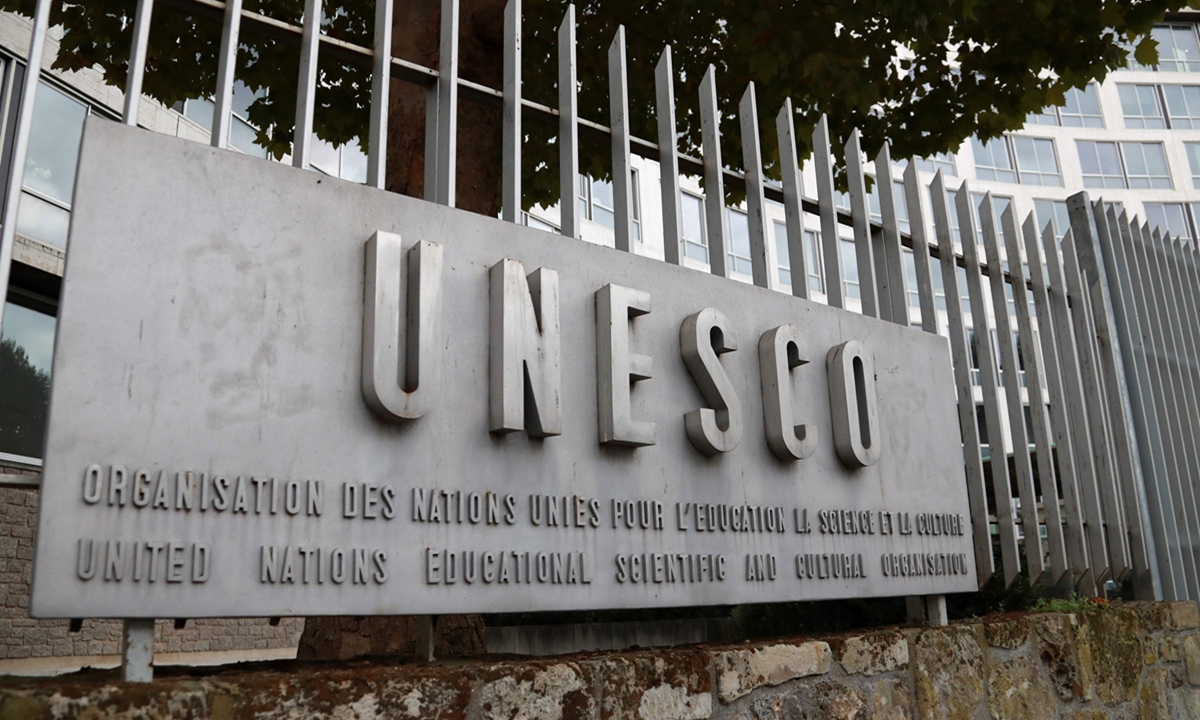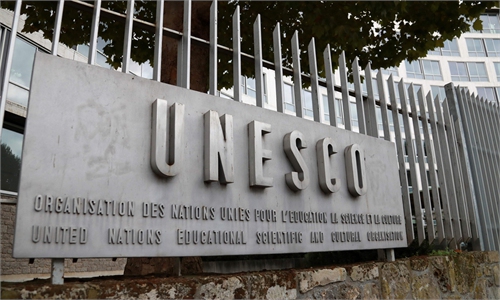
The United Nations Educational, Scientific and Cultural Organisation (UNESCO) headquarters in Paris Photo: VCG
The US privately notified the United Nations Educational, Scientific and Cultural Organization (UNESCO) last week that it has decided to rejoin the agency. Withdrawing from agreements and organizations and then rejoining them has become a common behavior for the US. The so-called "international rules" that the US talks about are nothing more than a synonym for selective adherence or abandonment.
Currently, the US owes UNESCO $619 million. To rejoin UNESCO, the Biden administration plans to request a $150 million appropriation from Congress to cover membership fees. It also stated that similar contributions would be provided in the ensuing years until the country fully repays the dues.
Dong Chunling, an associate research fellow at the Institute of American Studies, China Institutes of Contemporary International Relations, told the Global Times that the recent move by the US to rejoin UNESCO reflects the instability and uncertainty in US foreign policy. From the arbitrary withdrawal from international organizations during the Trump era to the gradual rejoining under Biden administration, it is evident that the US is politically polarized. "This is a drawback of their political system. As long as it remains unchanged, concerns about the current instability and uncertainty of the US will persist," Dong noted.
Yuan Zheng, deputy director and a senior fellow of the Institute of American Studies at the Chinese Academy of Social Sciences, echoed this view, stating that it is ironic that the US wants to rejoin UNESCO. On the one hand, with a change in president, the US has created a situation where it can withdraw from and rejoin international organizations and agreements at will, indicating an incoherence in its foreign policy. "On the other hand, the behavior of withdrawing, rejoining, and delaying payment of dues reflects a lack of seriousness in the US' approach to international rules and its own responsibilities and obligations. It is typical of hegemonic behavior," Yuan said.
In fact, the US government had previously hinted at its intention to "rejoin" UNESCO. On March 22, US Secretary of State Antony Blinken said that China is the single largest contributor to UNESCO and this carries a lot of weight. If the US is not at the table, it loses the opportunity to shape the organization's behavior, so it is important that the US return. This time, the US media described the US return to UNESCO as "to counter the growing influence of China and other adversaries at the United Nations culture and heritage organization.
Yuan said that there is a significant social division with sharp contradictions between the two major political parties in the US currently. It is challenging to reach a consensus on many issues. In this situation, China is undoubtedly a convenient excuse. Anything can be attributed to China's existence to provide practical motivation for implementing certain policies domestically.
On June 13, Chinese Foreign Ministry Spokesperson Wang Wenbin said China hopes this time the US decision is made out of a sense of responsibility and aimed at supporting multilateralism and contributing to international cooperation. The US withdrew twice from UNESCO, which had a negative impact on the organization's work.
"International organizations are not parks. Countries can't just come and go as they please. More importantly, the US must not view international organizations as places for geopolitical wrestling and pursue 'global leadership' in the name of the interests of the international community," Wang said.
In fact, the US has persistently pursued a hegemonic approach of the "America First" and "American exceptionalism." As a hegemonic country, the US pretends to play a global leadership role. However, it consistently places its own interests above international organizations and rules, prioritizing domestic law over international law.
Washington's approach of saying one thing and doing another, driven by its underlying logic of maintaining hegemony, deviates from the basic norms of international relations. This only accelerates the depletion of its international credibility and further tarnishes its international image.
"The actions of the US reveal its lack of minimal respect for international organizations and rules, reflecting typical hegemonic thinking. Even if the US returns this time, it cannot make a commitment to stop withdrawing in the future. This greatly undermines its soft power, international credibility, and international image," Dong said.
UNESCO and its member states should remain vigilant and aware of the arbitrary behavior of the US, which prioritizes US' own interests, as well as the harm caused by such behavior.

